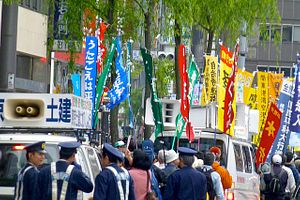The Japanese Constitution turned 68 this month. A constitution is a set of rules decided upon by the people of a nation in order to protect that nation and the livelihoods of its citizens, and is the foundation on which all other laws and systems are based. It is obvious, then, that a constitution needs to possess a degree of both stability and rigidity. Article 96 of the Japanese Constitution stipulates that any constitutional amendment needs to be passed by a majority of two thirds or more of both Houses of the Diet. It is likely that this requirement was put in place to make it more difficult to amend the Constitution in ways that run counter to its basic philosophy.
Likewise, the four great principles – sovereignty of the people, respect for basic human rights, pacifism, and international cooperation – set forth in the preamble of the Japanese Constitution are universal human values that should still be respected today. Indeed, these values are consistent with those expressed in the United Nations Charter, and we should continue to adhere to them.
Of course, it is ridiculous to say that the Constitution should never be amended under any circumstances, and as such there is little meaning in the old standoff between those who want to preserve the Constitution and those who want to amend it. If we have reached a point where changing times and global affairs mean that the provisions of the Constitution no longer fulfill their function of protecting the nation and its people, then naturally it is acceptable for the people themselves to decide to change it.
However, if we look at the ruling Liberal Democratic Party’s (LDP) proposed constitutional amendment, it is drafted from the perspective that the nation takes priority over its individual citizens. It demonstrates the kind of thinking that ignores or even rejects the basic philosophy of the Japanese Constitution. This should not be accepted under any circumstances. The draft proposal goes beyond the boundaries of a constitutional amendment, and should rather be described as an attempt to create a new Constitution. This “amendment” the LDP is attempting to adopt fundamentally repudiates the philosophy of the Japanese Constitution. Consequently, it has no continuity with the present Constitution, and in fact it could be said to be more reactionary in content than the old Meiji Constitution.
If the Abe Cabinet were to broach the subject of constitutional reform directly, it would face strong opposition and it would be very difficult for it to proceed. Instead, it has used sleight of hand and weasel words in a drip-drip-drip approach to bring about what is a revision to the Constitution in all but name. Last summer’s Cabinet decision permitting the use of the right to collective self-defense is a prime example of this. Now, the ruling parties are now trying to establish a legal framework that goes further than this. This method ignores the Constitution, and should never be permitted by a democratic nation that respects the rule of law.
If Prime Minister Shinzo Abe truly believes it is necessary to use the right to collective self-defense for the sake of Japan, he should put a proposal to amend Article 9 of the Constitution directly to the Japanese people. The government should not just take palliative measures, but make sure it engages in honest political governance.
For the government to avoid engaging in open discussion, and to conceal their purpose with fine-sounding words by building towards fait accompli in a slow, drip-drip-drip way, is to repeat the history of the years leading up to WWII. Then, people said to themselves, “Well, we have ended up coming this far, so there is nothing we can do about it.” This happened repeatedly, and so Japan found itself gradually sliding down the slippery slope into that terrible war. I am concerned that Abe’s use of similar methods will lead Japan in the wrong direction and cause irreparable damage to the lives of the Japanese people.
The philosophy espoused by the Japanese Constitution is founded upon the sovereignty of the people. In other words, a state with shared values is created based on a consensus obtained by free-thinking citizens engaging in free debate, and it is the Constitution that regulates this state and acts as the highest legislative instrument whose purpose is to protect the lives of its people. At the heart of this lies the expression of an individual’s free will – the most important constitutional principle.
I believe that now more than ever each citizen of Japan needs to understand this, and be prepared to speak up about it. That is a measure of just how dangerous the situation facing Japan today really is. When it comes to constitutional amendments, inciting or coercing people into a certain viewpoint is not something that could ever be described as sovereignty of the people.
Ichiro Ozawa is a Japanese politician and president of the People’s Life Party & Taro Yamamoto and Friends.
































